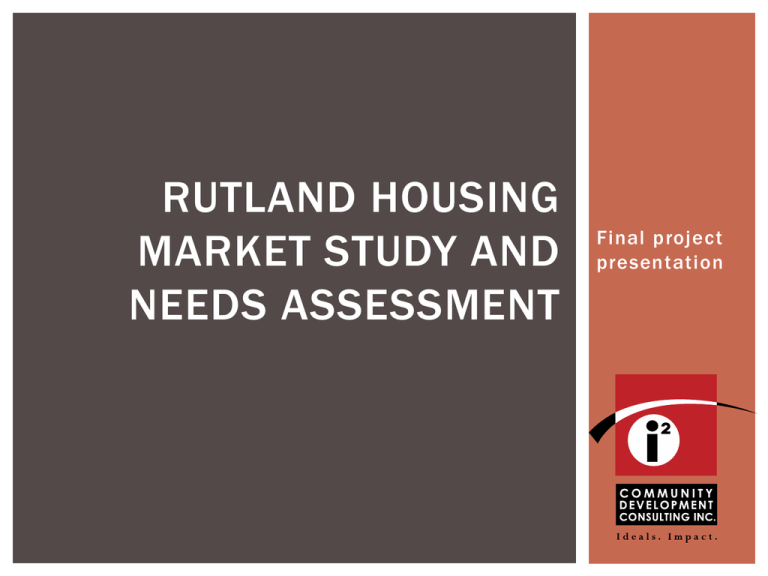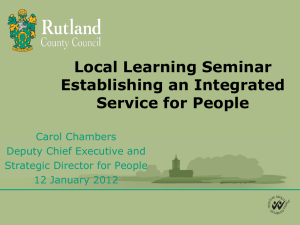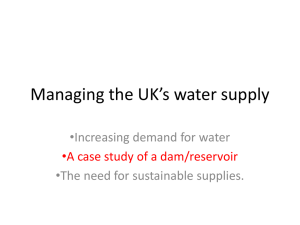to download: Rutland Housing Study Presentation
advertisement

RUTLAND HOUSING MARKET STUDY AND NEEDS ASSESSMENT Final project presentation AGENDA 6:00 Welcome and overview of the study 6:15 Presentation Recap of findings Discussion of recommendations 7:00 Questions and comments PROJECT TASKS FOR THE HOUSING STUDY Met with City staff and toured Rutland neighborhoods Interviewed local housing market stakeholders (Realtors®, affordable housing providers, landlords) Compiled, analyzed and mapped data about the Rutland housing market Meeting One: public feedback and input Developed strategic recommendations KEY TOPIC AREAS FOR TODAY Revitalizing neighborhoods (and addressing vacant/blighted properties) Promoting homeownership Af fordable housing needs REVITALIZING NEIGHBORHOODS REVITALIZATION IN RUTLAND: KEY FINDINGS The City of Rutland is losing population not just because of a regional economic decline, but also because it is not competing well against other towns when households decide where to live Poverty and unemployment is concentrated in particular neighborhoods in Rutland The housing “product” being of fered in parts of Rutland – especially older, small -multiunit stock – is not desired by the marketplace Key areas of concern are located west of Route 7 and close to downtown Locally Undesirable Land Uses (LULUs) may be contributing to some issues with vacant buildings COMPETITION FOR HOUSEHOLDS The region is not competing strongly for households 70,000 County locations are 60,000 outcompeting city locations for 50,000 40,000 household choices about where 30,000 to live 20,000 From 2000 to 2010, Rutland 10,000 City households declined by 0 1%; Rutland County increased by 1%. Areas west of Route 7 have Households declined the fastest Population 63,400 62,142 58,347 61,642 Rutland City Rutland County 18,436 18,230 1980 1990 17,292 16,495 2000 2010 Year Source: Vermont Housing Data (www.housingdata.org); US Census 2000 2010 % change Tract 9630 1,955 1,970 1% Tract 9631 1,713 1,644 -4% Tract 9632 1,400 1,356 -3% Tract 9633 2,384 2,434 2% Source: US Census Bureau CONCENTRATIONS OF POVERT Y Area Percent below poverty in 2010 Tract 9630 13% Tract 9631 25% Tract 9632 19% Tract 9633 11% Rutland City 16% Rutland County 12% Vermont 11% Area Unemployment rate, 2010 Rutland City 8.8% Rutland County 7.3% Vermont 6.2% Source: American Community Survey 2010 5-year estimates A HOUSING PRODUCT IN NEED OF IMPROVEMENT Median sale price of 2 -4 unit properties during 2010 -2012 was $75,000 (40% less than single-family) Current value does not support home improvements or financing “LULUS” AND VACANT BUILDINGS h St N Churc E x e te ve Sc ale A Stratton Rd ve Exempt r Pl se y St Ave Prev ille Fairvi ew Ave Geno Ave te r ee Cr k e Chas e Av Horton St rble Ave n Av e Utilities Rooming Houses Perkins Rd Curtis e a Free m n St o Hayw Av e Chapl in MISC Land Agricultural M us Ot ll Industrial Gi lrain Av e Common St r Commercial Son ia D r B lv d Porte Dorr D Mobile Home Hilltop Ter Alt a Ter Robinwoo d Ln y Ln ve Alle Ma Apartments (5+ Units) thern Pe r r r St St Dana Av 4-Family Central Ave St Pa r k Fo ster P l Woodland Dr Upland Dr 3-Family So u B Av e C Av e Ave A sA ger n St Gi or Dr e ri ne C a th B lv d g e tt i Av e son A Jack ng t o ve nA 2-Family Rach el Dr Gran dview Te r e rly Av Irv ing Hts Sha ro n Dr Nic ole Pl She dd Pl r Newpo rt D ve t re m St e St ard A 1-Family Hil l Pond Rd Elmwood Dr En g C lov e fly Av e ton S t no data/unsure Land Use Map Healy Ln B u tt e r in g Was h Lafayett e S t er St 200 Foot Buffer - Undesirable Land Uses* City Parcels hn Eas te Eas t S Pl Av gt on H ow Vacant Structures t Jo St ve l on P l Terril kA Nels D ee r S t St St d Gleas on Rd Pl Sain Davis oo c s to ru i Rd l Rd e C lark St NE S ch oo Av e Belle vue Av t S Ma in S ro t St Gr a n ce S St E Royce St St P os Spru 1st n St l Morse P to Was hing sfi eld E Cen t St t le S W r to n y Wa llie ri n H ar e Edg Alt Hills ide ll Th ra Ca Ct Pa r k e Ives Av Cente r M an Madi so n s Gib e Wa S p Tem Norton Pl Court S q St Jeffe Dr do w t Ex d St rs on Aik en Pl St Nichols lin Pla i Sto n Elm St Wales St ts R o w nk Sou th St Fo rest S t ge Wi llow S t B r o w n St Rid M erchan St ne A ve we S to endall Ave West St Ho Mead ow S t d St C ottage St Pine S t School S t d Dr William s t Av e d en R Av e Burnh am l Riv er St ll R Sum mer S Robbins St a Fr d be Baxter St mp C lev eland Beld t N Mai n S Pearl St H olly St Ash St Ca ve Library A ve P Trav ers e K Av e Ave Roberts Maple St e yR C linton Kin gs ley e Park Av Ct Kings ley Bu s wy 4 H igh St Wood Ave ve US H Smith St Ave Melro se Oa k St Wate r St t t A ve m lu nA int Av tR Em m e Co b ia Pie rpo en Haze l St Cl em Ri pl e Ev ergreen Ave Watk ins Ave Cra mton Ave She pard Ln State St North S t Lib ra ry A Mea 30 vacant structures out of 152 vacant structures are adjacent to land uses that are not desirable for residential property. Victor Pl Tu ttle Dr ve it Em e r t Rd Hillc re s N orth St Sea bury St us Ave Orchard Dr St Crescent olin n Lav erne Dr M ar ci a L Wendy Ln rw Ve rn on St Northea st She Rd o od City Dump Rd Patri US Hwy 7 Lincoln A St t t Adams S Churc h S Grov e S t Ve rn on Phillip s St r Rd Fiel d Av e Jan Ave Walnut St Vacant Structures and Undesirable Land Use o d Av e Av e Billings Dr * Undesirable Land Uses include Route 7 and West Street corridors, industrial uses, prisons, rooming houses, and flood-prone areas. 0 0.2 0.4 ± 0.8 Miles PROMOTING HOMEOWNERSHIP Area Homeownership Rate, 2010 Tract 9630 72% Tract 9631 29% Tract 9632 57% Tract 9633 49% Rutland City 52% Rutland County 70% Vermont 71% Source: American Community Survey 2010 5-year estimates PROMOTING HOMEOWNERSHIP: KEY THEMES Now is the time to buy (especially in Rutland)! A large pool of renter households exist that could qualify to buy a home Housing stock exists that could be converted from investor ownership to owner-occupancy Mortgage market issues are the major barrier NOW IS THE TIME TO BUY Median home price in Rutland of about $112,000 (28 percent decline from 2006) Affordable to households earning ~ $34,250 (56% of HAMFI) Estimated 829 renters in Rutland County have income between $22,000 and $55,000 and savings and debt characteristics to buy Another 600 renters in higher income tiers Median Sales Price Residential Properties 6 acres or less $180,000 $160,000 $140,000 $120,000 $100,000 Rutland City Rutland County $80,000 $60,000 $40,000 $20,000 $2000 2002 2004 2006 2008 2010 2012 (through 4/30/2012) Source: VT Property Transfer Tax data CONVERTING STOCK TO HOMEOWNERSHIP h St N Churc E x e te ve Sc ale A Stratton Rd Victor Pl Ave Prev ille Fairvi ew Ave Geno Ave r Common St Porte Dorr D Hilltop Ter Gi lrain Av e B lv d t r Pl Alle St te r ee Cr Chapl in Av e Hayw k e Chas e Av e Horton St Marble Av 480 singlefamily homes and 334 twofamily homes in Rutland are not owneroccupied ve oo d A Av e Curtis e n Av e Perkins Rd se y Ot Wall a Free m n St M us St Dana Av Alt a Ter y Ln St Pa r k Robinwoo d Ln Son ia D r Central Ave e n Av thern Pe r r ve ger 963300 Fo ster P l Woodland Dr Upland Dr So u B Av e sA C Av e ng Ave A ro t ve Gi or Dr e ri ne C a th B lv d i t t e g Av e so Jack Royce St St t St Gr a n ce S Gib n St A s on Rach el Dr Gran dview Te r Nic ole Pl She dd Pl r Newpo rt D re m St er S Irv ing Hts Sha ro n Dr Elmwood Dr En g C lov ve fly Av e ton S t erly A E as t Hil l Pond Rd B u tt e r s hin g A ve Healy Ln t E Wa t er St Investor Owned Investor Owned 2-Family 963000 Ave oward Lafayett e S Eas t S Pl Lav erne Dr H City Parcels Other Parcels Rd St e l on P gt on arri n l St Terril sfi eld d Av Nels Ed on g e rt oo ck Gleas on Rd Pl Hills ide W s to Census Tracts ru i Investor Owner 1-Family l Rd D ee r S t St l Morse P t S Ma in S n St St m ple H E Cen t St NE S ch oo Davis Court S q M an Av e C lark St e e Ives Av St Nichols Cente r Ct Te Norton Pl to Was hing Alt ll Th ra Belle vue Av t N Mai n S P os Spru St 1st Pa r k Aik en Pl Madi so n P la i e Sto n Elm St Wales St ts R o w St Sou th St Fo rest S t Dr lin nk B r o w n St ge M erchan St Rid A ve we ne Wi llow S t Ho School S t ve West St l a Fr S to St C ottage St Pine S t d t Rd l d en P Trav ers e Riv er St ll R Sum mer S Be Bu s wy 4 d d be Robbins St William s Av e Ave Burnh am e Av US H H igh St Ave Ken dall A ve Maple St Mead ow S t mp 963100 Av e Ca Baxter St yR Lib ra ry A Kin gs ley St Roberts e Park Av Ct Kings ley C lev eland Smith St Sea bury St n Dr ve Pearl St H olly St Ash St n Ave C linton St Crescent olin ve itus A Em e r Dr t Rd do w Hillc re s Mea Tu ttle d x E St y N orth Wa llie Ca St rs on Jeffe Wood Ave e b ia Melro se Oa k St Wate r St t t A ve m lu int Av tR Em m e Co Pie rpo Ri pl e en Haze l St Cl em Ev ergreen Ave Watk ins Ave Cra mton Ave She pard Ln State St North S t M ar ci a L Wendy Ln Ve rn on St Orchard Dr Walnut St d Northea st She dR rwo o City Dump Rd Patri US Hwy 7 Lincoln A St t t Adams S Churc h S Grov e S t Ve rn on Phillip s St r Rd Fiel d Av e Jan Ave 963200 Investor Owned Single and Two Family Homes Billings Dr ± MORTGAGE MARKET ISSUES Rutland County: 2006 2010 Home purchase loan denial rate 19% 17% Home improvement loan denial rate 30% 29% Refinance denial rate 29% 23% Purchase originations 844 246 Home improvement originations 286 101 Refinance originations 1,011 690 90+ day mortgage delinquency 0.8% 6.7% 90+ day credit card delinquency 9.2% 16.3% Source: 2010 HMDA data; New York Federal Reserve credit conditions data Hickory Street apartments, Rutland Housing Authority AFFORDABLE HOUSING HOUSING AFFORDABILIT Y IN RUTLAND: KEY FINDINGS Real household incomes have declined while rents have risen Housing cost burdens are much more common now than they were 10 years ago Cost burdens are as much a product of incomes as of house prices or rents Af fordable rental stock is concentrated in the City of Rutland out of proportion to its share of households and jobs in the region RENTAL STOCK PRICING VS. RENTER INCOMES • Unavailability of affordable rental stock in Rutland is most pressing for very low-income renters Rental Households Rental Units Considered Affordable* Less than $5,000 155 16 $5,000 to $9,999 326 153 $10,000 to $14,999 473 209 $15,000 to $19,999 373 185 $20,000 to $24,999 384 452 $25,000 to $34,999 603 1,138 $35,000 to $49,999 603 1,202 $50,000 to $74,999 522 21 $75,000 to $99,999 125 29 $100,000 to $149,999 12 0 $150,000 or more 11 0 Income Source: American Community Survey 2010 5-year estimates HOUSING COST BURDENS Rutland City: 2000 2010 % change Median gross rent (2010 dollars) $634 $723 14% Median income (2010 dollars) $39,317 $38,108 -3% Percent of renters earning under $35,000 who are cost burdened 58% 69% 11 points Percent of renters earning over $35,000 /who are cost burdened 3% 7% 4 points Percent of homeowners earning under $35,000 who are cost burdened 54% 70% 16 points Percent of homeowners earning over $35,000 /who are cost burdened 6% 24% 18 points Source: 2000 Census; American Community Survey 2010 5-year estimates CONCENTRATION OF SUBSIDIZED RENTAL HOUSING Jobs (as of May 2012) Households (2010) Subsidized Housing Units (2012) Rutland City 8,000 7,404 801 Rutland County 31,550 25,984 1,309 % of City within the County 25% 28% 61% Source: DoRAH; Vermont Department of Labor; 2010 Census RECOMMENDATIONS REVITALIZATION RECOMMENDATIONS: SUMMARY 1. Implement revitalization initiatives in the neighborhoods surrounding downtown 2. Use a “Healthy Neighborhoods” approach 3. Focus on a small area, building from strength rather than weakness 4. Neighborhood marketing 5. Connect neighbors to drive revitalization work REVITALIZATION RECOMMENDATIONS: SUMMARY 6. Incentivize and facilitate private market investment 7. Set outcomes by property, including targeted acquisition/rehab/resale 8. Invest in downtown and in key assets and amenities near the target area 9. Support community development nonprofits to develop a work focus on neighborhood revitalization 10. Support “big picture” planning ef forts to change the regional context “HEALTHY NEIGHBORHOODS” ORIENTATION A healthy neighborhood is: A place where it makes economic and emotional sense for people to invest their time, money and energy A place where neighbors successfully manage neighborhood -related issues and neighborhood change Outcome areas: Image Market Physical conditions Neighborhood self-management A healthy neighborhoods approach is oriented around increasing demand for the neighborhood. This is not the same type of activity as increasing housing supply, providing social services, or other activities that local governments and nonprofits are used to doing. TIGHT GEOGRAPHIC FOCUS, SELECTED BASED ON STRENGTHS A revitalization initiative will work best in a defined area (as small as 10-15 blocks) Core of the work happens house by house, block by block Need to pick this area based on strengths: Strong resident engagement Marketable assets (e.g. parks, schools, housing stock, location) Emerging market segments or at least potential market segments of desirable homebuyers that could be attracted to the neighborhood NEIGHBORHOOD MARKETING EXAMPLES Name the neighborhood Neighborhood ambassadors Realtors® on retainer Neighborhood tours Employer-based marketing NEIGHBORHOOD MARKETING EXAMPLES Beauty, History, Civic Spirit The Corn Hill Neighborhood Corn Hill, a historic treasure on the banks of the Genesee River next to Center City, offers the best of the old and new. It is a revitalized landmark community full of restored 19th century homes in a variety of modest and elaborate styles—that are blended well with 20th century townhouses and condominiums. In most cities, these kinds of neighborhoods are only accessible by the wealthy. Here in Rochester, people from all walks of life make Corn Hill their home…. CONNECTING NEIGHBORS: EXAMPLES Ice cream socials, dog walks, potlucks Beautification projects Purchasing cooperatives Neighborhood mini-grants One-on-one interviews, “neighbor circles” INCENTIVES FOR PRIVATE INVESTMENT Housing rehab loan fund, purchase / rehab loan packages Tax stabilization or abatement for owner -occupants purchasing in the target neighborhood Study regulatory reforms for landlords “Buy -hold” fund to intervene in key properties and make sure they go to a good buyer SET OUTCOMES BY PROPERT Y Examples: Market an exterior repair loan Give help to this owner to bring building up to code and improve their rental management practices Get this homeowner better connected to their neighbors Get a strong homebuyer into this property that is for sale – help the seller to market it, hold a “pick your neighbor” party Acquire, convert this property from a 3-family back into a 1-family and sell it to a strong buyer Properties are next to an acquisition-rehab project – help neighbors organize a beautification effort AFFORDABLE RENTAL DEVELOPMENT? Goal of revitalization needs to be to increase demand, not increase the supply of af fordable units Generally, priority should go towards encouraging more people to buy homes in the neighborhood, including converting small multifamily properties to more appropriate designs for owner occupancy whenever practicable Want to encourage private sector investment, including investment by responsible landlords That said: af fordable rental development financing tools provide a unique resource to address existing, problem multifamily properties and rehabilitate them to a very high standard. INVEST IN DOWNTOWN, KEY AMENITIES Downtown location for high -end rental development, cultural attractions Farmer’s market, other quality -of-life investments Waterways (East Creek, Otter Creek) / greenways / green space POTENTIAL ROLES FOR COMMUNIT Y DEVELOPMENT NONPROFITS Community building and organizing Neighborhood marketing Loan programs Targeted redevelopment Property management assistance for small landlords “BIG PICTURE” PLANNING EFFORTS Regional planning around: Economic and workforce development Land use planning Arts and culture Environmental preservation Food systems Recreation Education Public health Regional collaborations between local governments COST IMPLICATIONS TRIAGE APPROACH FOR VACANT / BLIGHTED HOUSING Distressed Property Intervention Decision Tree Located in strong no neighborhood? yes Let the market create the solution Historic or arch. significance? yes Historic rehab project no LULU impacts? yes Feasible to mitigate? no Demolish and create buffer no yes Moderate rehab cost? no yes In target no revitalization area? yes Marketable with incentives? yes Rehab appraisal gap < demo + infill cost? Incentives for purchase -rehab yes Acquisitionrehab-resale project; or rental project if part of a cluster of multi-unit properties Incentives for purchase -rehab no Demolish and create green space or build infill no Rehab appraisal gap < demo cost? yes Acquisition / rehab / resale no Demo and land bank TACKLING REGIONAL AFFORDABLE HOUSING CHALLENGES KEY ACTION IMPLICATIONS OF STUDY FINDINGS FOR AFFORDABLE HOUSING Future af fordable housing creation needs to focus on households at income levels under $20,000 Future af fordable housing creation needs to improve fair housing choice for these low -income populations – more should not be created in existing high -poverty Census Tracts in Rutland Given overall economic and population trends, af fordable housing creation should avoid adding significant net new units to the stock, when possible Initiatives to boost employment and earnings are critically important for working-age households facing af fordability challenges



